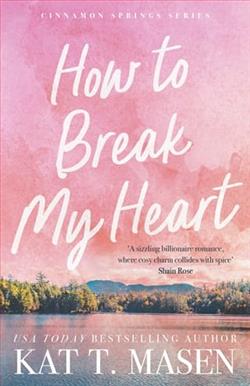Page 174 of Craving Venom
The words come easy from him.
I huff a sarcastic laugh and roll my eyes just hard enough to break the moment before it softens into something dangerous. “You’ve seen me cry, curse, and nearly kill you. Lower the bar.”
He doesn’t respond. Doesn’t need to. I drop my gaze. My cheek brushes his shoulder. We sway in silence, not because it’s comfortable, but because neither of us knows how to fill it without breaking something.
I let my head drift slightly, angling it to catch the direction of his gaze. His eyes aren’t on me; they’re fixed across the room. I blink and tilt my head back a little, trying to see what has his attention.
“Why do you always leave it open?”
I almost trip as my foot stumbles across the floor, but I catch myself against his chest while his hand reaches out to steady me.
My spine stiffens because that’s not something I tell people. Not something I want to share. That kind of truth is ammo. It turns into sharp edges when handed to the wrong hands. And Zane’s hands are all blade.
But if I want him to open up then I have to give him something first.
“I can’t live in close spaces, Zane. When I was only ten, my cousin put me in a basement. We were playing a game and he forgot about me. I was in there for two days. I screamed, I cried. Meanwhile, my parents thought I was kidnapped, so they were looking for me in all the wrong places. I passed out at some point. Honestly, I might’ve felt like I had died.”
“And yet, you survived.”
“I survived,” I echo, “because at some point… I opened my eyes down there. In that basement. And I realized no one was coming for me.”
Zane watches me like a wolf watching a rabbit try to convince itself it has fangs.
“Maybe that’s why I didn’t die,” I go on. “My mind stopped waiting for rescue and started figuring out how to adapt. That’s what the brain does under pressure. It doesn’t sit and cry. It calculates. It negotiates with death.”
“You didn’t care.”
I look up. My brow pulls in. “What?”
“You didn’t care if someone was looking for you,” he explains. “That’s how you made it out. You knew you were alone, so your brain made sense of it. It adjusted.”
I shake my head, laughing under my breath. “No. That’s not it. That’s not how it works.”
He watches me, daring me to explain myself.
“A person can only accept being in a closed space when they have a motive, a will to survive, or a glimmer of hope.”
“That’s a pretty way to dress up pain, Faith.”
“Excuse me?”
He shakes his head slowly as our feet move in unison. His fingers flex once at my waist.
“You didn’t choose survival,” he clarifies. “You endured. That’s different.”
I stiffen in his grip. “And what, you think I just curled up and waited to die?”
“No,” he answers. “I think your brain did what it had to do to keep the lights on. You survived because the lizard part of you refused to give up oxygen.”
I bite back a laugh. “Wow. Thanks for the neurobiology lesson.”
“You didn’t claw your way out.” He finally looks down at me again. “Someone opened the door. That’s what saved you.”
Heat rushes up my neck. Not from shame but from the low boil of insult.
“You really don’t believe in strength, do you?”
He shakes his head once. “I believe in instinct. Strength doesn’t keep you alive.Feardoes. People like to talk about fear as though it’s something small, something shameful, like it’s a stain you’re supposed to scrub out of your skin. But that’s bullshit. Fear is the thing that keeps your heart beating when everything else wants to stop. It’s the reason you duck when a car comes screeching toward you, the reason you hold your breath in the dark, listening for footsteps. They call it weakness because they don’t understand it. People who call it weakness have never been afraid for their lives. They’ve never felt it crawl through their veins and rewire their bones. Fear is the last emotion to shut down in your body.”















